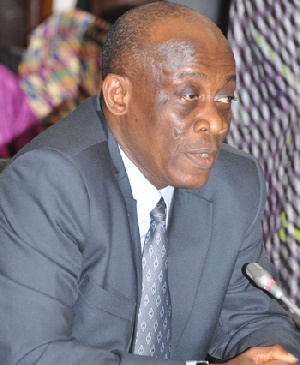Finance Minister Emmanuel Seth Terkper has counseled critics of the John Mahama led National Democratic Congress government to be truthful to the facts in the matter of the Ghanaian economy even if they have an axe to grind with him.
According to the Finance Minister, despite the impressive performance the country was making in the area of economic management, certain impenitent critics of government have made it an article of faith to talk down the economy and continues to make wild speculations about the cedi.
Mr. Terkper said it would be prudent if his critics shelve their hatred for him and stick to verifiable facts when analyzing the nation’s economy under his watch.
In an apparent reference to the inexorable censure by his former boss and immediate past finance minister, Dr Kwabena Duffour, his newly established policy think tank, Institute of Fiscal Studies (IFS) and some collaborators, Seth Terkper, who made the statement at the signing of a US$220 million agreement towards strengthening the national economy, stated “We can have our differences but let’s stick to the facts.”
The agreement, which was signed on behalf of Ghana by Seth Terkper while the new World Bank Country Director, Mr Henry G.R Kerali, signed for the Bank, would provide US$25 million for the transport sector project; US$45 million for the public financial management reform (PFMR) project and US$150 million as budgetary support.
The Finance Minister explained that the signing of the agreement is an indication of the economic gains the country was making, adding that “If the skeptics have any doubts, they ought to be cleared with the signing of these agreements,” he added.
Explaining what constitute the agreement, Seth Terkper noted, the agreement for the transport sector project was aimed at bridging the financing gap on the Ayamfuri-Asawinso road rehabilitation which had come about as a result of changes made in the implementation of civil works and the construction of selected roads on the Accra East Corridor.
He said the rehabilitation of the 52.2 kilometre Ayamfuri-Asawinso road was critical in the south-north transport corridor linking western Ghana, the timber and mineral rich areas, and the neighboring countries to the Takoradi Port.
The 15-kilometre Accra East Corridor roads, the Finance Minister explained, were part of a network of arterial roads that linked suburban areas in the eastern part of Accra to the Central Business District and critical facilities including the Accra International Airport and the 37 Military Hospital.
Commenting on the agreement for the PFMR project, the finance minister said it was for the second phase of a reform aimed at strengthening public sector financial management (PFM), adding that the World Bank was supporting key elements of the new PFM reform strategy developed by the government.
He explained that the new PFM strategy sought to establish an efficient, transparent and accountable resource mobilization, allocation and management, adding that the strategy had the goal of using fiscal resources to meet development priorities and commitments under the medium-term development policy framework.
Mr Terkper explained that the credit was expected to contribute to the attainment of key macroeconomic targets outlined in the budget, which include non-real GDP growth of 2.7 percent, overall GDP including oil growth of 3.9 percent, and end-year inflation target of 11.5 percent.
The World Bank Country Director for Ghana, Liberia and Sierra Leone, Mr Henry G.R Kerali, said the challenges Ghana was facing was typical of any country in transition, saying that “challenges are there to be addressed, let’s not run away from them. You cannot develop if you don’t challenge yourself.”
Seth Terkper has since his appointment had torrid times at the Finance Ministry as persons such as Prof Newman Kusi, Executive Director of his former boss’ think tank, the IFS, IMANI Ghana and even some members of his own party, the NDC, have harshly critic his style and management of the national economy.
Aside some members of the NDC calling for his head at a time the economy recorded its worse performance which also led to the fast depreciation of the cedi, Prof Kusi, IMANI Ghana and some civil society groups and opposition elements continually took Seth Terkper to the cleaners.
Prior to the International Monetary Fund’s first review of its bailout to Ghana, Prof Kusi and his acolytes of doomsayers, who has consistently attacked Terkper over his economic policies, predicted the government will miss out, but that was to be disapproved by the Fund.
On his part, former Finance Minister Dr. Kwabena Duffuor has also persistently blamed his former deputy, Terkper, for not continuing the hedging he (Dr Duffuor) started against unstable oil prices, resulting in Ghana losing millions.
“I believe that this time, we have lost or missed an opportunity in the sense that Ghana was going to be in a win, win situation because the consumption of crude was going to be a big bonus for us.
“If we were buying at hundred, it is now 40 or 50 we would have made huge savings so for consumption you have made savings there. At the same time if we had put the put option in place and we had sold the oil at that price because of the output option we would have also gained, so Ghana was going to win on the consumption side and win on the export side.
“Unfortunately, it didn’t happen because the government was looking at the hedging issues again and while they were looking at the issues the prices crashed and it affected everything in the country, especially the budget.
“So our situation is different and very sad, it is a missed opportunity, we would have made millions out of this but it didn’t happen,”
Dr. Duffuor recently opined in a lecture at the 2015 Natural Resource Governance Institute on the theme, “Falling prices, rising risks” at St Catherine’s College at Oxford in the UK.
Business News of Tuesday, 11 August 2015
Source: The Al-Hajj

















